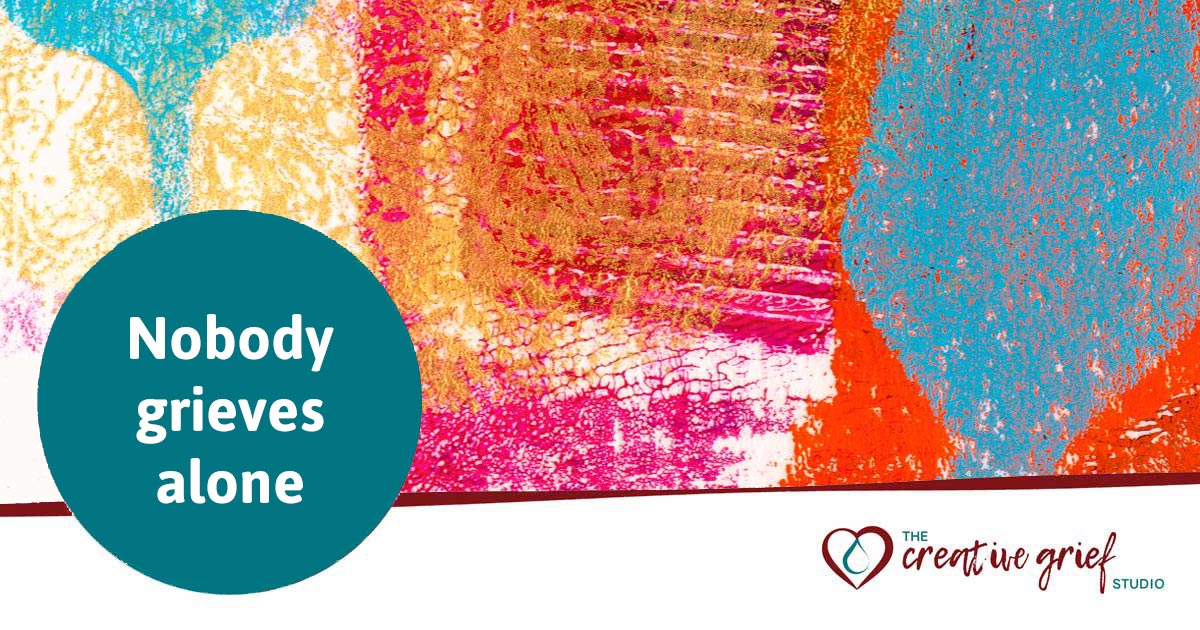One of the uncontroversial ideas you’ll find across many different approaches to grief support is the idea that social support matters. When grievers feel connected to and supported by others, their grief outcomes are better than those who typically struggle most in their grieving with feeling abandoned, alienated, and alone in their grief experiences.
Not alone even when “alone”
Given this understanding of the importance of relationship and connection in grieving, it’s critical that we, as Creative Grief Support Practitioners, understand and remember that nobody grieves alone – even those who are alone. This is because of our capacity to carry others’ voices – or at least what we think they’d think and say – with us, and to remain in conversation in our minds, even when we’re apart, alone, or others have died. When we, as practitioners, understand this, we can work in much more supportive and relational ways. We can help those who feel alone to listen to the conversations they’re having with others in their own minds; to explore and understand how these conversations are influencing how they feel about themselves and their loss and grief; and to bring forward voices that nurture a sense of belonging while turning down the volume on the voices that seem to be offering judgement or rejection instead.
Grieving and adapting to life after loss are meaning-making processes. Whether our client has many supportive living friends and family, or whether they walk “alone” in the world, the many relationships they’ve been a part of and even those they have only wished to be a part of, have the capacity to influence their meaning-making after loss. Yes, we all have agency to turn up the volume of certain voices or to turn down the volume of others, but we’re always making meaning by drawing on a choir of voices. We’re never making meaning alone.
Questions to consider
- How have your grief experiences been influenced by community and relationships in your life?
- Have you had moments where you felt isolated and reached out to community to find the support of relationships?
- How has community and relationship been helpful to your experience?
- How has community and relationship hindered your experience?
- When there has been hindrance, have you tried to engage creativity to address your needs in a different way?
- Have you re-made your community in various ways in light of your grief experiences?
- What has your community learned from you about grief and creativity as you’ve moved through your experiences?
- What relationships have most surprised you as you creatively approached your grief experiences?
Now your turn
And what questions can you come up with that might support your clients – perhaps especially those who have felt alone in their grief – to explore the relational nature of their grief experience, and to exercise their agency to rebuild their sense of belonging?
So many theories and approaches to grief support privilege the idea of “confidentiality and client privacy” over practices that support our clients to recognise and bring agency to their relational experience, so that they can create a greater sense of belonging. Of course we do need to respect a client’s privacy and confidentiality and always work within the ethics of respect and consent. What we find though, is that clients are often very keen to bring their family and friends into their grief support work – both literally and figuratively. And the participation of chosen family and friends can bring a beautiful richness and sense of belonging that is so comforting for all involved. It’s not enough to simply ask your clients whether they have a support network. If you’re curious to learn more nuanced, creative, and unique ways that you can help your client to experience a sense of belonging as they grieve, apply to join our next Certification in Creative Grief Support.

